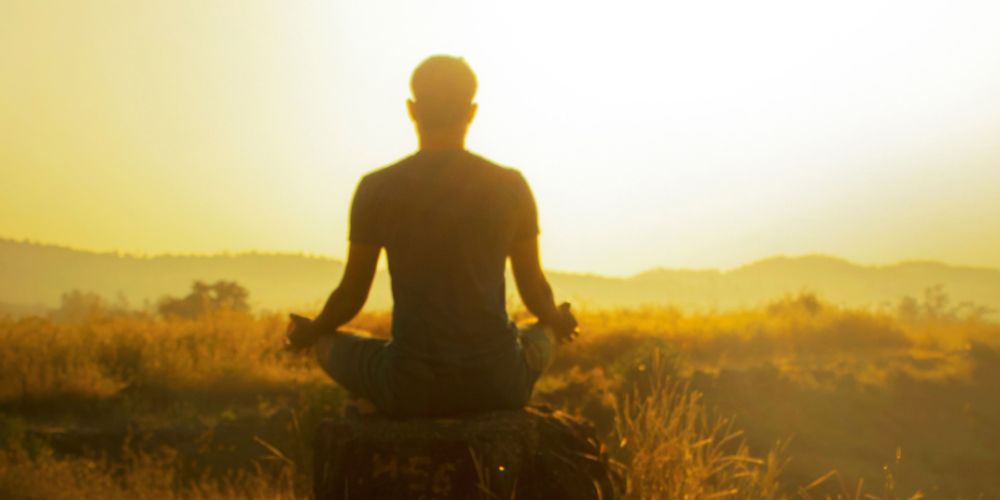What Is The Best Way To Meditate For Beginners? (3 Tips)
-
 Dan Rivers
Dan Rivers
- 4 May 2022

With so many meditations to choose from, it can be hard to pick the right one. If you’re starting out, you might have been overwhelmed by the amount of choice you have when you start meditating.
But based on observation after meditating for more than 8 years, the best meditation will be the one that allows you to stay focused, without your mind drifting away to different places.
A major purpose of meditation is to keep the mind at peace and allow it to rest properly, rather than always filling it with thoughts.
Not that the mind can be without thoughts, that simply isn’t possible, but the more thoughts you have surrounding your head, the more distractions you have.
The more you are able to focus on your thoughts, the clearer the path becomes, and the less your mind starts drifting into the future or past.
There’s the notion of being in the present moment which goes hand in hand with meditation. If your mind is always thinking of something, never given the chance to take a break, you end up with more stress and anxiety.
When we talk about anxiety and stress reduction, it’s usually achieved through mindfulness.
Meditation is broad because there are meditations such as movement meditations, but going off by the strict definition, meditation can be anything.
But if you’re a beginner looking to start out with the practice in its traditional sense, here’s what you should know, as well as some tips along your journey.
How You Meditate Mindfully
I recommend sitting in a position where you feel comfortable. Many use benches for that purpose, but a chair works fine as well. The reason being is that if you lay down, your mind already knows what laying down feels like, and thus, there’s more of a risk that you lose focus during the meditation, which would defeat the purpose to begin with.
If you’re coming into meditation with the mindset that it’s gonna be something new, I recommend sitting down, closing your eyes, and taking note of your breathing pattern.
It’s important you close your eyes, even if you can technically meditate with your eyes open, but that way, you open yourself up for distractions. You’ll also want to make sure you meditate in a quiet environment, one that makes you feel at peace. You’ll have two choices here.
You can either continue focusing on your breathing, which may be harder for beginners, or you can focus on the thoughts you get.
But don’t attach any labels to those thoughts, and be in the present moment while you’re at it. That’s the most basic form of meditation that’s accessible to everyone.
With so many meditations to choose from, it’s hard to find the right one but mindfulness is ideal here, as the fewer components you focus on, the more you can center that attention into creating a deep meditation.
Now, as a beginner, you may not experience the benefits the first time, but you can, in just a matter of days, experience something different.
See meditation as going to the gym, and creating a habit. Now, with mindfulness meditation, you are not guided in any way, so it’s common to experience the common impostor syndrome of feeling like you’re meditating the wrong way.
But that thought is damaging to the practice, as it’d shift the attention away from actually meditating, and rather than meditating, you’d just be sitting.
Don’t worry about getting it right the first time. In fact, if you’re able to keep your focus on your thoughts without dwelling whatsoever, you are meditating properly. You aren’t controlling your thoughts through meditation, you are just allowing them to exist and learning to find comfort with them.
The discomfort the thoughts produce can make you feel like your mind is the one controlling you.
While, as mentioned before, the best way to meditate for beginners is one that keeps you focused, mindfulness is by far the easiest to do. One reason many people don’t start meditation is that they think it’s hard, and we’re wired to run away from things we consider hard.
An alternative to focusing on your breath or thoughts, focus on what you’re feeling when you meditate. Though this may be harder, because of the fact that deliberate meditation is something new for the mind, it’s still a viable option, even if you’re a beginner.
Keep It Short and Simple
Earlier I compared meditation to going to the gym. That’s because meditation is a way to get mentally fit.
If you set a goal of meditating for too long, that could be shooting too high, which there’s nothing wrong with, but at the beginning, it’s better to do consistent 20-minute meditations over the span of an entire week rather than one gigantic one-hour meditation for one day and abandoning the practice.
The recommendation of meditation is for you to do it for around 10 to 20 minutes.
I personally recommend 20 minutes, as it’s not too short and not too long, the right balance. 10 minutes can absolutely be beneficial, but more so 20 minutes. Once you build this routine, missing out on meditation practice will make you feel abstinence, but it’s abstinence to a positive habit.
The other point I want to address is keeping it simple. It’s common to think you need a bunch of candles, or meditate under a waterfall while the sun is perfectly aligned… you get the idea.
While meditating in nature can be even more beneficial, magnifying the benefits of meditation, it’s not needed if you’re getting started. You can do it in your bedroom, it doesn’t need to get more complicated than that.
After You Learn to Meditate
Meditation takes time to form as a habit, as with anything else. But the more you do it, the more you are drawn to it. And the longer you’ll be able to do it.
You go from meditating 20 minutes a day to 30. Then from 30 to 40, and from 40 to 60, and so on.
After you learn to meditate, you lose the traction of time, because you reach a deep connection with yourself, where the experience goes from being hard to blissful.
There are hard parts of meditation, I will not deny it. But it gets much easier and pleasant the longer you do it, but don’t start off for long, unless you are willing to commit to the practice.
Over the span of 3-4 months, you are likely to see some type of favorable change that translates to your everyday life.
Do Guided Meditations
While you are perfectly capable of meditating on your own, this doesn’t help everyone at the beginning, especially if they can’t help their impostor syndrome no matter what.
In this case, you can meditate using meditation audios where someone guides you or download a meditation app if you want to make the experience more linear.
If you feel tingling sensations or vibrations, these are some common indications that you are making progress.
Guided meditations often instruct you to repeat certain mantras, these mantras, in turn, can make you feel more at peace, achieving the primary goal of meditation. Generally, the more you have a goal with meditation, no matter if it’s guided or if you need to find one that suits you for your goals, the better.
With guidance, you have a sense of accountability, which can make you less likely to abandon it, even if statistically, most end up leaving the meditation, so have an objective in mind.
The good thing about guided meditations is that you’re more likely to see any progress sooner, the bad part is that you’re externalizing the control of your meditation.
Have a Room For Meditation
While this isn’t necessary, it can help those who find it hard to meditate on a specific room they already use for something else, this could be because of what they associate that room with.
It goes back to the concept of the mind being new to meditation and taking things a step further, not only sitting on a meditation bench. By no means is changing your room for meditation necessary, but it can help in the sense of subconscious association.
However, at the same time, you want to keep things as simple as possible, so no matter who you are, you can make it work no matter where you meditate, as you can technically meditate anywhere. This is only a bonus tip.


